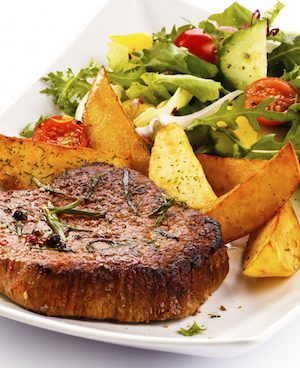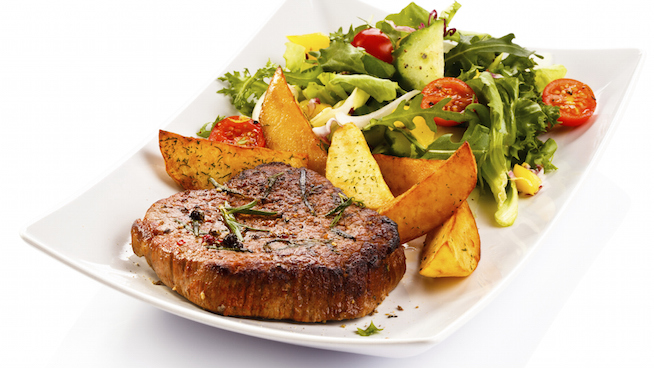Building muscle requires an increase in calories; that is, to gain weight you must eat more calories than you burn each day. But if you go overboard and eat too much, you’ll kick-start the fat-storing process. So the key is to eat just enough to facilitate the muscle-gaining process but not so much that you’ll add fat along with it.
Muscle Building Foods
Apples
The specific polyphenols in apples help to increase muscle strength and prevent muscle fatigue, allowing you to train harder for longer.
Beef
Beef is important for building lean muscle due to its protein content, cholesterol, zinc, B vitamins and iron content.
Beets
A good source of betaine, also known as trimethylglycine, this nutrient not only enhances liver and joint repair, but also has been shown in clinical research to increase muscle strength and power.
Brown Rice
A slow-digesting whole grain that provides you longer-lasting energy throughout the day, and during workouts. Brown rice also can help boost your growth hormone (GH) levels, which are critical for encouraging lean muscle growth, fat loss and strength gains.
Cantaloupe
Due to it’s relatively low fructose content, this melon is one of the few fruits that is actually a fast-digesting carb. That makes it a good carb to have first thing in the morning after a long night of fasting and one of the few good fruits to eat after workouts.
Cottage Cheese
Rich in casein protein, cottage cheese is a great go-to protein source, especially before bed.
Eggs
Eggs are known as the perfect protein, but their ability to boost lean muscle and strength gains isn’t due to just the protein alone. It gets a lot of help from the yolks, where the cholesterol is found.
Ezekial 4:9 Bread
Ezekiel bread is made from organic sprouted whole grains. Because it contains grains and legumes, the bread is a complete protein, which means it contains all nine of the amino acids your body can’t produce on its own – the ones needed for lean muscle growth.
Fruits and Vegetables
Fruits and vegetables are a rich source of antioxidants, which are essential for the healthy functioning of your immune system. They also provide tons of other nutrients, such as vitamin C, vitamin E, and beta-carotene. Finally, your body requires the fiber these fruits and vegetables provide to aid in proper digestion and nutrient uptake.
Greek Yogurt
Like plain yogurt, Greek yogurt starts from the same source: milk. Greek yogurt, however, has more protein (a whopping 20 g per cup) and fewer carbs (9 g per cup) than regular yogurt (16 g protein, 16 g carbs per cup).
Milk
Contains both whey and casein and is rich in the amino acid glutamine. Organic milk has about 70% more omega-3 fatty acids than conventional milk.
Oatmeal
Oatmeal is an great source of carbohydrates due to both its low glycemic index (GI) value and the fact it is minimally processed.
Skinless Chicken
Like beef, chicken is an excellent source of high quality protein, which is important for muscle maintenance and repair, bone health, and weight maintenance. And of course, there are so many ways you can cook and prepare chicken. Go down to the store and you can easily find chicken meat cut into single serving sizes that can be seasoned and quickly cooked.
Spinach
A good source of glutamine, the amino acid that is important for lean muscle growth.
Tuna and Other Fish
Fish are high in protein, low in fat, and rich in omega-3 fatty acids. The omega-3s are essential because they aid in fat loss and ensure the proper function of your body processes, such as your metabolism.
Quinoa
A complete protein in addition to being a slow-digesting carb, quinoa has been linked with an increase in insulin-like growth factor-1 (IGF-1) levels, an important factor associated with lean muscle and strength gains.
Wonka Pixy Stix
These contain dextrose, meaning this carb doesn’t even need to be digested – it literally goes straight into your bloodstream, getting those carbs straight to your muscles for the fastest recovery possible after workouts.
Wheat Germ
Rich in zinc, iron, selenium, potassium and B vitamins, high in fiber and protein, with a good amount of branched-chain amino acids (BCAAs), arginine and glutamine.
Whey Protein
There is a reason why whey protein supplements are the most popular supplement in the fitness industry: they provide a fast and convenient source of protein at an affordable price. Bodybuilders normally use them when they wake up, right after their workout, and mixed with some of their meals. For the rest of us, a scoop in our shakers right after our workouts can be very effective for muscle mass gains. It’s important that you still get high quality protein from whole foods, and use whey protein as a boost.
Whole Grains
Whole grains digest more efficiently and provide more nutrients than refined grains. This promotes sustained energy levels and overall health. In particular, brown rice can help boost your growth hormone levels, which are critical for encouraging lean muscle growth, fat loss, and strength gains.
Diet Plan Examples
These are examples of the types of diet plans you should follow when you want to build muscle without gaining fat.
Meal 1: 8 a.m.
10 egg whites
1¼ cups oatmeal (dry measure) or 11⁄2 raisin bagels
8 oz. orange juice or 1 cup mixed fruit
Meal Totals: 669 calories, 58 g protein, 93 g carbs, 7 g fat
Meal 2: 11 a.m.
8 oz. chicken breast
1 small to medium potato*
Meal Totals: 409 calories, 56 g protein, 37 g carbs, 3 g fat
Meal 3: 1 p.m.
Whey protein shake (2 scoops)
6-8 rice cakes*
Meal Totals: 450 calories, 48 g protein, 58 g carbs, 2 g fat
Meal 4 (post-workout): 3 p.m.
8 oz. turkey breast
2-3 cups cooked pasta or white rice*
1 whole-grain roll**
Meal Totals: 1,096 calories, 78 g protein, 177 g carbs, 4 g fat
Meal 5: 6 p.m.
8 oz. ground beef (95% lean)
1 slice low-fat cheese
2 slices whole-grain bread
1 piece fruit**
Meal Totals: 593 calories, 59 g protein, 57 g carbs, 13 g fa
Meal 6: 9 p.m.
Whey protein shake (2 scoops)
Meal Totals: 170 calories, 40 g protein, 2 g carbs, 0 g fat
Meal Totals: 669 calories, 58 g protein, 93 g carbs, 7 g fat
Daily Totals: 3,387 calories, 339 g protein, 424 g carbs, 29 g fat
* If you have a hard time staying lean, eat the smaller portion of carbs at this meal.
** Optional. If you start the plan and find you’re adding bodyfat, drop this menu item.


